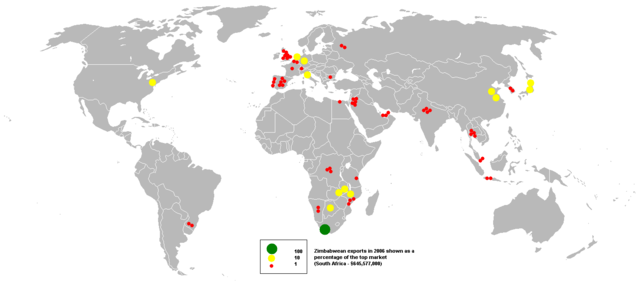Loading AI tools
Main article: Economy of Zimbabwe

The government of Zimbabwe faces a variety of economic problems after having abandoned earlier efforts to develop a market-oriented economy. Problems include a shortage of foreign exchange, soaring inflation, and supply shortages. Zimbabwe's involvement from 1998 to 2002 in the war in the Democratic Republic of the Congo drained hundreds of millions of dollars from the economy.[1]
Mineral exports, agriculture, and tourism are the main foreign currency earners of Zimbabwe.[2] Zimbabwe is the biggest trading partner of South Africa on the continent.[3] The downward spiral of the economy has been attributed mainly to mismanagement and corruption of the Mugabe regime and the eviction of more than 4,000 white farmers in the controversial land redistribution of 2000.[4][5][6][7] Since this land redistribution began, agricultural exports, especially tobacco, have declined sharply. The Zimbabwe Conservation Task Force released a report in June 2007, estimating 60% of Zimbabwe's wildlife has died since 2000. The report warns that the loss of life combined with widespread deforestation is potentially disastrous for the tourist industry.[8]
In 2005, the government, led by central bank governor Gideon Gono, started making overtures that white farmers could come back. There were 400 to 500 still left in the country, but much of the land that had been confiscated was no longer productive.[9] In January 2007, the government even let some white farmers sign long term leases.[10] But, the government reversed course again and started demanding that all remaining white farmers leave the country or face jail.[11][12]
Inflation rose from an annual rate of 32% in 1998 to an official estimated high of 7,634.8% in August 2007,[13] a state of hyperinflation. The IMF predicted inflation will reach 6,430% by the end of 2008.[14] Estimates from private sector economists estimate inflation at about four times the official figures.
On June 21, 2007, the U.S. ambassador to Zimbabwe, Christopher Dell, told The Guardian newspaper that inflation could reach 1.5 million per cent (1,500,000%) by the end of the year. The current unofficial inflation rate is above 11,000% and the black-market exchange rate is Z$3,650,000 to the pound.[15][16] On July 13, 2007, the Zimbabwe government said it had temporarily stopped publishing (official) inflation figures, a move that observers said was meant to draw attention away from runaway inflation which has come to symbolize the country's unprecedented economic meltdown.[17]
In August 2006, a new revalued Zimbabwean dollar was introduced, equal to 1000 of the prior Zimbabwean. The exchange rate fell from 24 old Zimbabwean dollars per U.S. dollar (USD) in 1998 to 250,000 prior or 250 new Zimbabwean dollars per USD at the official rate,[18] and an estimated 120,000,000 old or 120,000 revalued Zimbabwean dollars per US dollar on the parallel market,[19] in June 2007.
Mugabe points to foreign governments and alleged "sabotage" as the cause of the fall of the Zimbabwean economy, as well as the country's 80% formal unemployment rate.[20] Critics of Mugabe's administration, including the majority of the international community, blame Mugabe's controversial program which sought to seize land from white commercial farmers. Mugabe has repeatedly blamed sanctions imposed on Zimbabwe by the European Union and the United States for the state of the Zimbabwean economy. However, these sanctions only target government officials and not ordinary citizens.[21] In a recent meeting of the Southern African Development Community, a call was issued for the sanctions to be removed.[22]
- Organised Violence and Torture in Zimbabwe in 1999, 1999. Zimbabwe Human Rights NGO Forum.
- "Country Profile – Zimbabwe". Foreign Affairs and International Trade Canada. Retrieved =2007-12-02.
Since the country is well endowed with natural resources such as minerals, arable land and wildlife, many opportunities lie in resource-based activities such as mining, agriculture and tourism, and their downstream industrial activities.
{{cite web}}: Check date values in:|accessdate=(help)CS1 maint: extra punctuation (link) - "Zimbabwe-South Africa economic relations since 2000". Africa News. 2007-10-31. Retrieved 2007-12-03.
Zimbabwe remains South Africa's most important trading partner in Africa
- "Zimbabwe President Mugabe labels white farmers 'enemies'" — CNN — April 18, 2000
- Robinson, Simon. "A Tale of Two Countries" — Time Magazine — Monday, Feb. 18, 2002
- "Zimbabwe forbids white farmers to harvest" — USA Today — 06/24/2002
- "White farmers under siege in Zimbabwe" — BBC — Thursday, 15 August, 2002
- Nick Wadhams (2007-08-01). "Zimbabwe's Wildlife Decimated by Economic Crisis". Nairobi: National Geographic News. Retrieved 2007-08-05.
{{cite news}}: Check date values in:|date=(help) - Meldrum, Andrew. "As country heads for disaster, Zimbabwe calls for return of white farmers" — The Guardian — May 21, 2005
- Timberg, Craig. "White Farmers Given Leases In Zimbabwe" — Washington Post — Saturday, January 6, 2007
- "Zimbabwe threatens white farmers" — AP — (c/o Washington Post — Monday, February 5, 2007
- Chinaka, Cris. "Zimbabwe threatens white farmers on evictions" — Reuters — August 8, 2007
- "IMF says Zimbabwe inflation to hit 6 000 percent mark". ZimOnline. 2007-05-15. Retrieved 2007-12-03.
In its World Economic Outlook for April 2007, the IMF said the Consumer Price Index (CPI) was set to end the year at 2 879.5 percent, before hitting 6 470.8 percent in 2008.
- How to stay alive when it all runs out, July 12, 2007. The Economist.
- , U.S. Department of State, 2004
Wikiwand in your browser!
Seamless Wikipedia browsing. On steroids.
Every time you click a link to Wikipedia, Wiktionary or Wikiquote in your browser's search results, it will show the modern Wikiwand interface.
Wikiwand extension is a five stars, simple, with minimum permission required to keep your browsing private, safe and transparent.